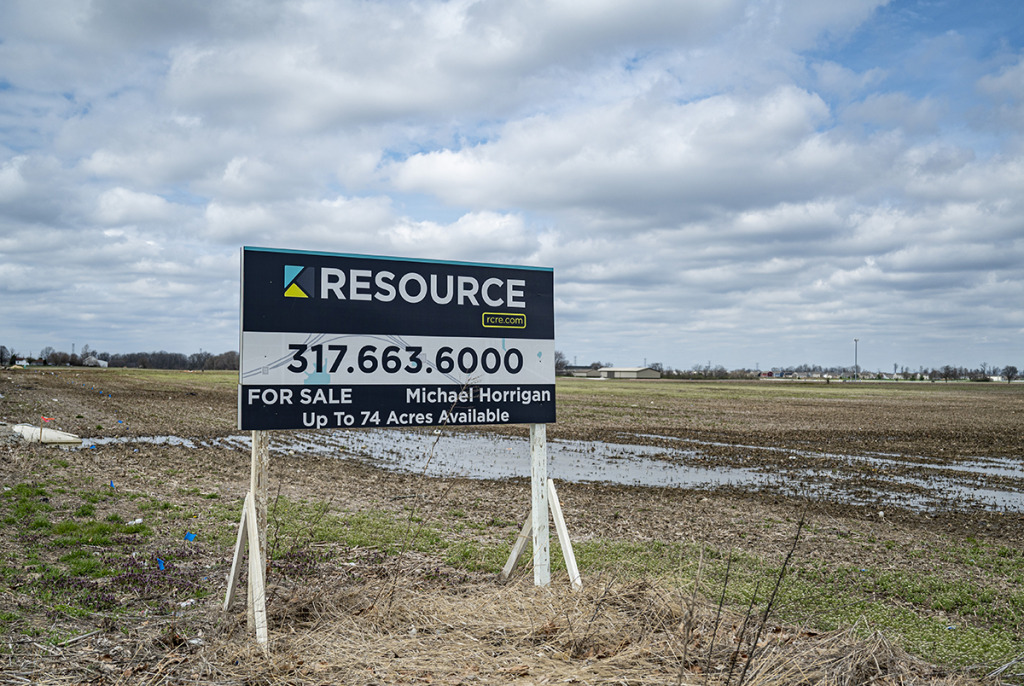Subscriber Benefit
As a subscriber you can listen to articles at work, in the car, or while you work out. Subscribe NowState lawmakers on Monday unanimously advanced a proposal tasking the Indiana State Department of Agriculture with creation of an inventory of farmland lost in the last decade—whether to industry, housing, renewable energy or otherwise.
Bill author Rep. Kendall Culp, R-Rensselaer, said the detailed data would serve as a foundation for future efforts to preserve farmland, even floating an incentive program for those wishing to sell.
“The goal here in Indiana should [be to] keep farmers on the farm producing food,” Culp told the Indiana Capital Chronicle.
Culp himself is a full-time farmer, raising corn, soybeans and beef cattle with his family, according to his caucus biography.
House Bill 1557 would require the agriculture department to inventory Hoosier farmland lost from 2010 to 2022, identify what use that land was turned toward and submit a report to the legislative council in 2024 with findings and recommendations.
Speaking before the House Agriculture and Rural Development Committee, Culp called agriculture a “stabilizing force” for small, rural Hoosier economies and emphasized its importance for consumers across the world.
“The overarching part of this bill, in my mind, is food security,” Culp said.
Economic development
Culp said no specific development project inspired the bill. But several witnesses said they’d heard complaints about an in-progress innovation district in Boone County—in which the state snapped up thousands of acres of land—as well as large solar energy projects.
“This certainly is not a bill to say that we want to stop any kind of development,” Culp said after the meeting. “… As the landowner, you still have your private property rights. If you want to sell … you have that right.”
But the information compiled through his bill, he said, could inform future efforts to conserve farmland.
“That data is going to be really important to know where to know who you’re competing against, what you’re competing against,” Culp said. Incentives on land going for $50,000 an acre would likely be infeasible, for example, as opposed to land selling for $15,000 an acre.
Efforts underway
The agriculture department has already begun working with the Department of Local Government Finance on data sources and timelines, said Katie Nelson, legislative director for the state agriculture department. It could also pull data from the U.S. Department of Agriculture’s Farm Service Agency and National Agricultural Statistics Services, according to Culp.
“We believe this bill is a positive first step in understanding the past decade and the current agricultural landscape across the state,” Nelson told lawmakers.
Some lawmakers expressed interest in tracking foreign farmland ownership— Rep. Bob Cherry, R-Greenfield, said he was concerned about Chinese state ownership—but Culp said the current version of the bill didn’t include that.
The bill looks to have plenty of support: multiple Democrats commented in support of the bill and asked to be added to it after the unanimous vote. Committee chair Mike Aylesworth, R-Hebron, is also a co-author.
“I’ve farmed for a good share of my life, and I know that food security is paramount,” Aylesworth said. “[The Midwest] has been known … as the breadbasket of the United States. And we’re the breadbasket of the world. It’s very important that we get some data.”
The Indiana Capital Chronicle is an independent, not-for-profit news organization that covers state government, policy and elections.
Please enable JavaScript to view this content.


Never mind that most Republican state lawmakers represent rural constituencies in areas that – wait for it – are facing increasing development “threats.” Here’s a novel idea: why don’t Republican’s let farmers decided if they want to sell or keep farming? It’s a free-market approach the GOP used to embrace with enthusiasm.